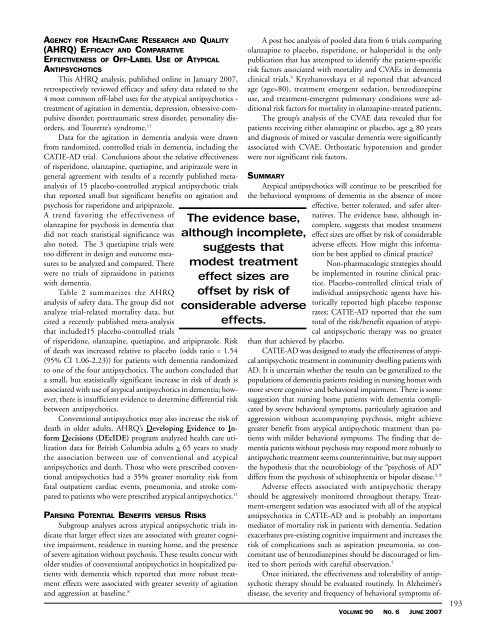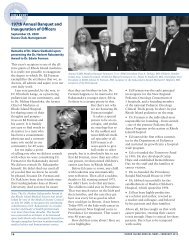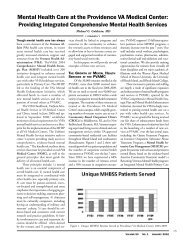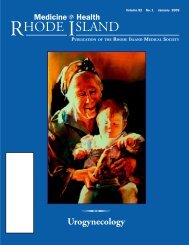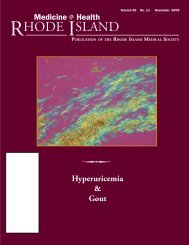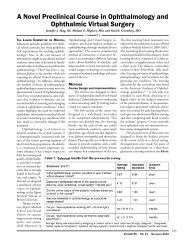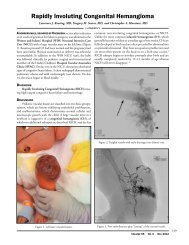June, No.6 - Rhode Island Medical Society
June, No.6 - Rhode Island Medical Society
June, No.6 - Rhode Island Medical Society
You also want an ePaper? Increase the reach of your titles
YUMPU automatically turns print PDFs into web optimized ePapers that Google loves.
AGENCY FOR HEALTHCARE RESEARCH AND QUALITY(AHRQ) EFFICACY AND COMPARATIVEEFFECTIVENESS OF OFF-LABEL USE OF ATYPICALANTIPSYCHOTICSThis AHRQ analysis, published online in January 2007,retrospectively reviewed efficacy and safety data related to the4 most common off-label uses for the atypical antipsychotics -treatment of agitation in dementia, depression, obsessive-compulsivedisorder, posttraumatic stress disorder, personality disorders,and Tourette’s syndrome. 11Data for the agitation in dementia analysis were drawnfrom randomized, controlled trials in dementia, including theCATIE-AD trial. Conclusions about the relative effectivenessof risperidone, olanzapine, quetiapine, and aripirazole were ingeneral agreement with results of a recently published metaanalysisof 15 placebo-controlled atypical antipsychotic trialsthat reported small but significant benefits on agitation andpsychosis for risperidone and aripiprazole.A trend favoring the effectiveness ofolanzapine for psychosis in dementia thatdid not reach statistical significance wasalso noted. The 3 quetiapine trials weretoo different in design and outcome measuresto be analyzed and compared. Therewere no trials of ziprasidone in patientswith dementia.Table 2 summarizes the AHRQanalysis of safety data. The group did notanalyze trial-related mortality data, butcited a recently published meta-analysisthat included15 placebo-controlled trialsof risperidone, olanzapine, quetiapine, and aripiprazole. Riskof death was increased relative to placebo (odds ratio = 1.54(95% CI 1.06-2.23)) for patients with dementia randomizedto one of the four antipsychotics. The authors concluded thata small, but statistically significant increase in risk of death isassociated with use of atypical antipsychotics in dementia; however,there is insufficient evidence to determine differential riskbetween antipsychotics.Conventional antipsychotics may also increase the risk ofdeath in older adults. AHRQ’s Developing Evidence to InformDecisions (DEcIDE) program analyzed health care utilizationdata for British Columbia adults > 65 years to studythe association between use of conventional and atypicalantipsychotics and death. Those who were prescribed conventionalantipsychotics had a 35% greater mortality risk fromfatal outpatient cardiac events, pneumonia, and stroke comparedto patients who were prescribed atypical antipsychotics. 11PARSING POTENTIAL BENEFITS VERSUS RISKSSubgroup analyses across atypical antipsychotic trials indicatethat larger effect sizes are associated with greater cognitiveimpairment, residence in nursing home, and the presenceof severe agitation without psychosis. These results concur witholder studies of conventional antipsychotics in hospitalized patientswith dementia which reported that more robust treatmenteffects were associated with greater severity of agitationand aggression at baseline. 8The evidence base,although incomplete,suggests thatmodest treatmenteffect sizes areoffset by risk ofconsiderable adverseeffects.A post hoc analysis of pooled data from 6 trials comparingolanzapine to placebo, risperidone, or haloperidol is the onlypublication that has attempted to identify the patient-specificrisk factors associated with mortality and CVAEs in dementiaclinical trials. 5 Kryzhanovskaya et al reported that advancedage (age=80), treatment emergent sedation, benzodiazepineuse, and treatment-emergent pulmonary conditions were additionalrisk factors for mortality in olanzapine-treated patients.The group’s analysis of the CVAE data revealed that forpatients receiving either olanzapine or placebo, age > 80 yearsand diagnosis of mixed or vascular dementia were significantlyassociated with CVAE. Orthostatic hypotension and genderwere not significant risk factors.SUMMARYAtypical antipsychotics will continue to be prescribed forthe behavioral symptoms of dementia in the absence of moreeffective, better tolerated, and safer alternatives.The evidence base, although incomplete,suggests that modest treatmenteffect sizes are offset by risk of considerableadverse effects. How might this informationbe best applied to clinical practice?Non-pharmacologic strategies shouldbe implemented in routine clinical practice.Placebo-controlled clinical trials ofindividual antipsychotic agents have historicallyreported high placebo responserates; CATIE-AD reported that the sumtotal of the risk/benefit equation of atypicalantipsychotic therapy was no greaterthan that achieved by placebo.CATIE-AD was designed to study the effectiveness of atypicalantipsychotic treatment in community dwelling patients withAD. It is uncertain whether the results can be generalized to thepopulations of dementia patients residing in nursing homes withmore severe cognitive and behavioral impairment. There is somesuggestion that nursing home patients with dementia complicatedby severe behavioral symptoms, particularly agitation andaggression without accompanying psychosis, might achievegreater benefit from atypical antipsychotic treatment than patientswith milder behavioral symptoms. The finding that dementiapatients without psychosis may respond more robustly toantipsychotic treatment seems counterintuitive, but may supportthe hypothesis that the neurobiology of the “psychosis of AD”differs from the psychosis of schizophrenia or bipolar disease. 3, 8Adverse effects associated with antipsychotic therapyshould be aggressively monitored throughout therapy. Treatment-emergentsedation was associated with all of the atypicalantipsychotics in CATIE-AD and is probably an importantmediator of mortality risk in patients with dementia. Sedationexacerbates pre-existing cognitive impairment and increases therisk of complications such as aspiration pneumonia, so concomitantuse of benzodiazepines should be discouraged or limitedto short periods with careful observation. 5Once initiated, the effectiveness and tolerability of antipsychotictherapy should be evaluated routinely. In Alzheimer’sdisease, the severity and frequency of behavioral symptoms of-VOLUME 90 NO. 6 JUNE 2007193


